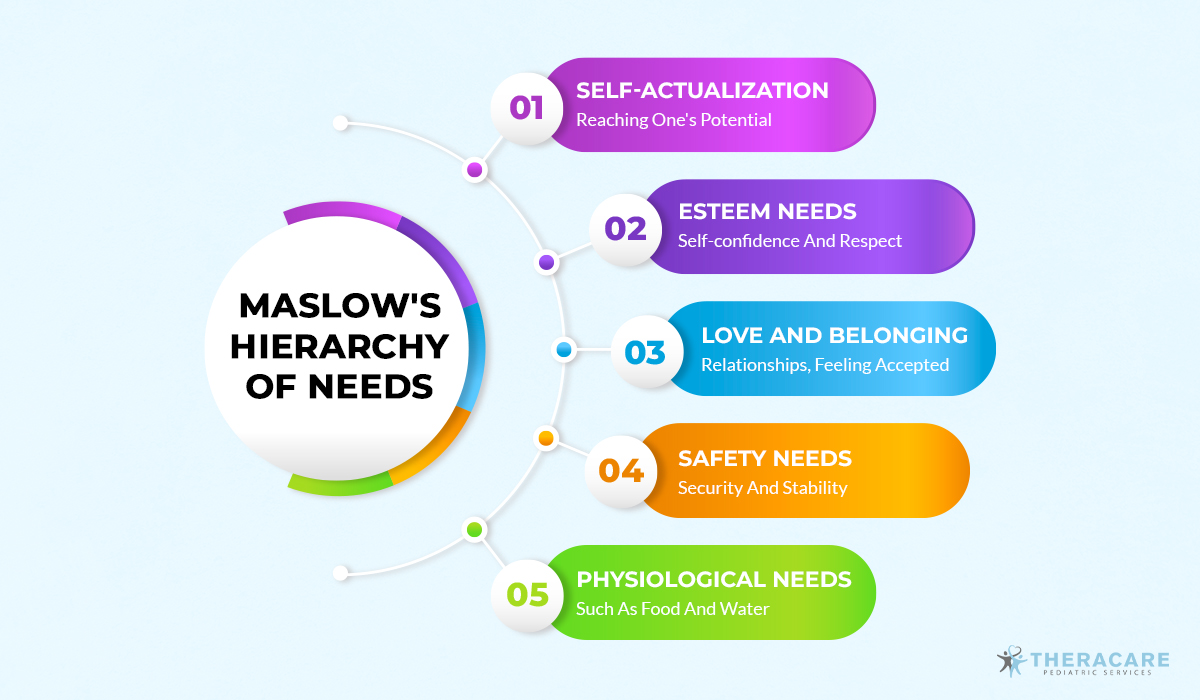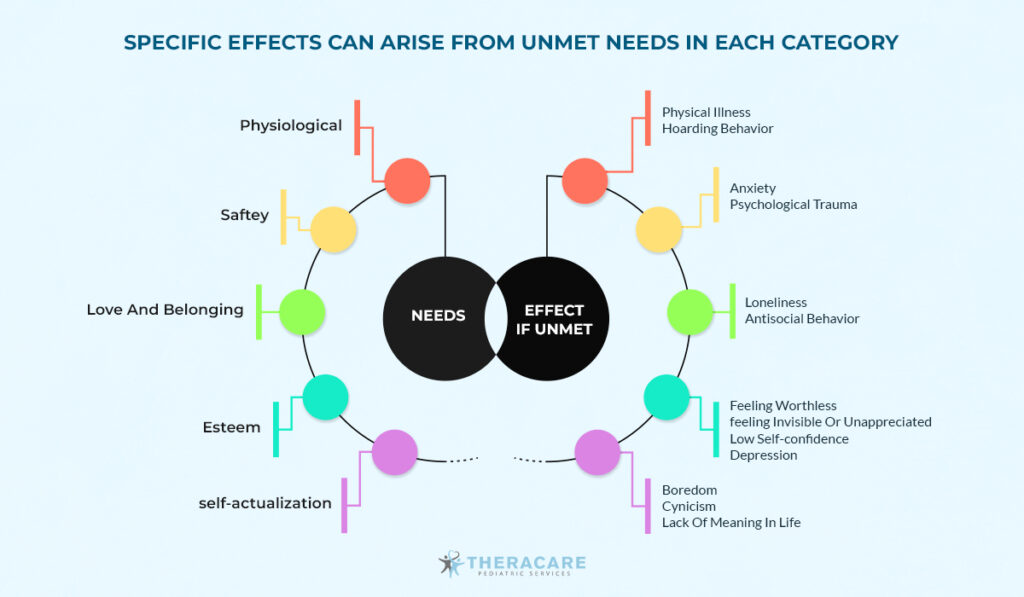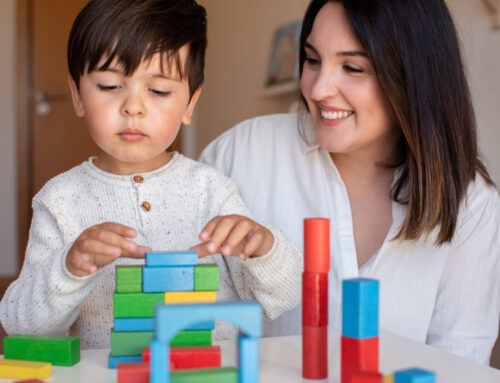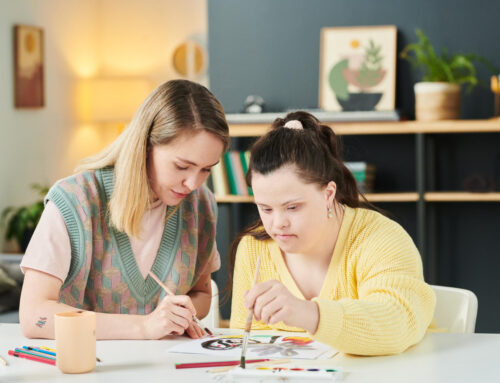In childhood development, every child possesses a unique potential waiting to be unleashed. At Theracare Pediatric Services, understanding Maslow’s Hierarchy of Needs is the key to unlocking this potential.
This influential psychological theory, proposed by Abraham Maslow, delves into the fundamental human needs & their hierarchy, forming the foundation of our tailored learning strategies for children.
Theracare Pediatric Services takes this concept further by applying it to their learning strategies when working with children with special education needs.
In this blog post, we will look at what exactly Maslow’s Hierarchy of Needs entails, including its five core layers – Physiological & Safety Needs; Love & Belonging; Confidence; Self Esteem; & Self Actualization – as well as how Theracare incorporates them into their behavior management programs which are specifically tailored towards efficient learning outcomes in pediatrics care.
Read on to gain a deeper insight into how Maslow’s hierarchy provides an invaluable framework for setting personal goals for growth within each student we work with!
Maslow’s Hierarchy Of Needs: A Comprehensive Overview

A renowned psychologist, Abraham Maslow, introduced the concept of a hierarchical pyramid representing human needs.
At its core, this pyramid includes five levels, each building upon the one below. The levels, from the most basic to the most advanced, are as follows:
- Physiological Needs: These are the foundational requirements for survival, such as food, water, shelter & sleep. It becomes easier for a child to focus on learning or growth if they address these physiological needs.
- Safety Needs: Children seek safety & security once their physiological needs are met. This includes protection from physical harm, a stable & nurturing environment & a predictable routine.
- Love & Belonging: Children yearn for belonging & social connection once safety is secured. This level encompasses friendships, family bonds & positive relationships with peers & caregivers.
- Esteem Needs: This level revolves around the need for recognition, self-respect & esteem from others. Children strive for accomplishments, success & positive feedback from their surroundings.
- Self-Actualization: The pyramid’s pinnacle represents the desire for personal growth, self-fulfillment & reaching one’s true potential.
What Happens When Someone Is Unable To Meet Their Needs?
Specific effects can arise from unmet needs in each category., such as:

Maslow’s theory posits that individuals must have their needs at each level primarily fulfilled to progress to the subsequent level. According to this theory, unmet needs preoccupy the mind, impeding the pursuit of higher-level needs in the pyramid.
Consequently, if individuals strive to address their basic physiological and safety needs, they cannot actively pursue higher needs such as love, esteem, and self-actualization.
Applying Maslow’s Hierarchy Of Needs To Learning Strategies
Understanding Maslow’s Hierarchy of Needs empowers us to create effective learning strategies that cater to a child’s developmental stage & individual requirements.
At Theracare Pediatric Services, we recognize that every child is unique, & no two learning paths are identical.
Here’s how we utilize this influential theory in our therapy services:
-
Addressing Physiological & Safety Needs
Before embarking on any learning journey, we ensure that a child’s physiological & safety needs are met. For example, we prioritize a comfortable & secure environment during therapy sessions, allowing children to feel at ease & receptive to learning.
Our expert therapists work closely with caregivers to create supportive routines, ensuring the child’s physiological needs & emotional safety are assured.
-
Ensuring Safety Needs Are Met
We strive to create an environment where children feel safe, secure & respected. Our therapists ensure clear but firm boundaries are set & provide guidance on appropriate behaviors & expectations.
We also emphasize effective communication between caregivers, teachers & other professionals involved in the child’s development process to guarantee that safety needs are always met.
-
Fostering Love & Belonging
Incorporating the need for love & belonging, we encourage positive social interactions & cultivate a sense of community during therapy sessions. Group therapy activities facilitate peer connections, promoting feelings of acceptance & inclusion.
Our therapists also work with families to foster strong emotional bonds, nurturing a supportive network for the child’s growth.
-
Boosting Self-Esteem
As children progress through their therapy journey, building self-esteem is paramount. Theracare Pediatric Services employs positive reinforcement, acknowledging & celebrating every achievement, no matter how small.
Children gain confidence & motivation to embrace new challenges by recognizing their progress & enhancing their overall development.
-
Encouraging Self-Actualization
Our ultimate goal at Theracare Pediatric Services is to help children reach their highest potential. By tailoring individualized therapy plans, we focus on nurturing each child’s unique strengths & interests.
Our dedicated team of pediatric therapists remains committed to guiding children toward self-actualization, empowering them to achieve their dreams.
Pediatric Therapy Techniques & Strategies At Theracare
To align with Maslow’s Hierarchy of Needs & to address each level effectively, Theracare Pediatric Services employs various therapy techniques & strategies:
- Sensory Integration Therapy: For children with sensory processing difficulties, this therapy technique helps regulate their physiological needs & promotes a sense of safety in their environment.
- Applied Behavior Analysis (ABA): ABA therapy fosters positive behaviors & social skills, fulfilling a child’s need for love & belonging through social interaction & rewarding positive behavior.
- Play-Based Therapy: Recognizing the importance of play in childhood development, play-based therapy helps children build self-esteem, develop problem-solving skills, & express emotions freely.
- Speech Therapy: By addressing speech & communication challenges, speech therapy enhances a child’s ability to connect with others, reinforcing their sense of belonging.
- Occupational Therapy: Occupational therapy focuses on enhancing fine motor skills & self-help abilities, enabling children to become more independent & confident in their capabilities.
The Theracare Advantage: Passion, Expertise & Commitment
What sets Theracare Pediatric Services apart is our team of passionate & dedicated pediatric therapists spread across every corner of Arizona. Each therapist possesses a wealth of expertise in various specialties, ensuring that we cater to the diverse needs of our young clients.
Our therapists are committed to positively impacting every child they work with, fostering an environment that prioritizes individual growth, development, & well-being.
Conclusion
As we traverse the complex terrain of childhood development, Maslow’s Hierarchy of Needs illuminates our path at Theracare Pediatric Services. By addressing each child’s physiological, safety, love & belonging, esteem, & self-actualization needs, we create a solid foundation for learning & growth.
Our tailored therapy techniques & strategies, aligned with Maslow’s theory, provide the necessary support for children to flourish.
With a team of dedicated pediatric therapists, Theracare is committed to nurturing the potential within every child, empowering them to reach new heights & embrace a brighter future.
Together, we unlock the true essence of childhood, allowing each child to thrive & shine uniquely.





